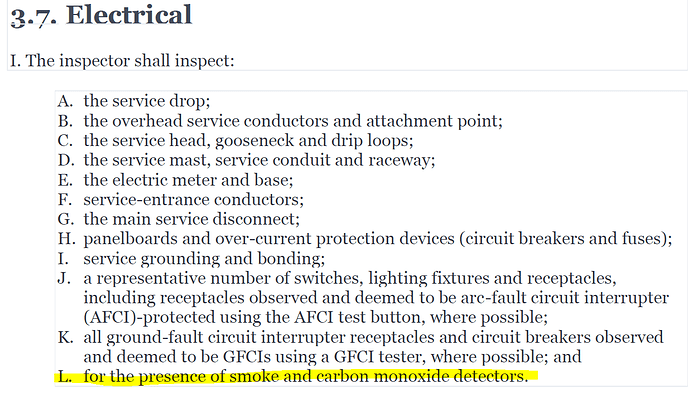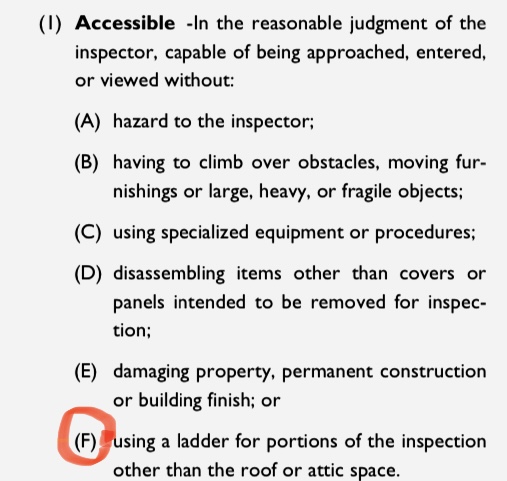Got that.
Got them.
But when 6 detectors are all screaming, how do I find detector #7 that is incorrectly wired?
SOME models give me a helpful flashing light. MOST do not.
I offer a full service package, which incudes minor on-the-spot repairs in the package price.
Let me preface this by saying I’m really not trying to be argumentative or combative but am always intrigued by the, “I don’t test smoke detectors” concept. I’m really curious how it’s received. I feel like in my area I’d be run out of town. Given the “newer than 10 years” law in my region it’s kind of a big deal to test them.
Local law aside, the idea that you don’t test something since it might not work later could apply to any part of the house. By this metric we wouldn’t test any appliances, fixtures, outlets or anything mechanical in the house for fear it stops working after we leave. The whole purpose of our being at a house is to document what works… drumroll please, when we are there. I’ve seen some report write-ups that explain limitations of the “test” function of detectors and that’s great. But, to just not test them at all, IMO, is not doing our job as HIs.
I check the date as I said before, but as Randy pointed out pressing the “test” button simply tells you it makes noise and has electrical power; it will not confirm proper operation of the sensors in the unit. So to follow up on your “one step further” testing do you check recalls for smoke detectors? Many of the Kidde units have been recalled and your testing them will not determine that!
" I check the date as I said before, but as Randy pointed out pressing the “test” button simply tells you it makes noise and has electrical power; it will not confirm proper operation of the sensors in the unit"
Robert, I explain that to every customer when I push the button, if I push it. If I suspect there is an alarm system I don’t take the chance. Generally I just tell people to replace them all, tested or not, unless the house is relatively new.
No, the alarms don’t seem to communicate battery status. The USI alarms have a few more modern features for their communication, but they are terrible in other ways.
" Kidde Recalls TruSense Smoke and Combination Smoke/Carbon Monoxide Alarms Due to Risk of Failure to Alert Consumers to a Fire"
========
What I see pretty often is the painting crew came in, generate a metric boatload of plaster dust, and all the detectors are coated in it. I try to educate painting crews about protecting detectors without visible effect on behavior. I take the alarms, blow them clean, and test them with fake smoke, they usually recover.
========
I’ve encountered several older detectors where the test button DOES check sensor operation.
These were all photoelectric units, and the button is mechanical, and drops into the smoke chamber between the light and the sensor.
I assume they stopped doing this after the radioactive detectors became prominent.
=====
My latest thing is calling out ionization detectors. The neighboring jurisdiction has all but banned them, and I’m on board to help get rid of those things.
https://www.creia.org/this-year---don-t-just-change-your-smoke-alarm-batteries-change-your-smoke-alarms---smoke-alarms-that-fail
“This Year – Don’t Just Change Your Smoke Alarm Batteries Change Your Smoke Alarms-: Smoke Alarms That Fail”
=====
That’s still not an answer to the OP question “how can I best test connected alarms”.
And… quite often… something is wrong at that level. Battery powered detectors (often without battery) are installed on hardwired detector rings… for example.
I never press the button. I do pull them down to see the date and if 10 year battery units have replaced the code hardwired units I write them up. That is prohibited by law.
So. Thru all of this.
If you push the test button and you hear an alarm you know the alarm is working.
If multiple units alarm all at once, you may not be able to determine which alarm is working and which is not.
If you do not have fake smoke, you have no idea if any of them actually “detect smoke”
If you do not have fake carbon monoxide, you have no idea if any of them detect “carbon monoxide”.
If none are chirping, you assume the batteries are good or there is no battery at all.
So in effect, the only conclusive thing you can realistically do is determine if one or more alarms is working, if any batteries are depleting (chirping), their age and if they are present.
Based on these limitations, I am not surprised that many inspectors choose to only follow the SOP.
Greetings from. Massachusetts.
Not any answer for the OP, but here in the state of crazies we are not required to test these as upon sale the seller must have had them inspected and upgraded as needed by the local Fire department.
So there is no mention in our SOP in this regard.
But a question for someone. If I was to do an inspection in line with Internachi SOP would this suffice
At the inspection it was determined that smoke, fire and/or carbon monoxide detectors were present.
In Indiana, SOP requires inspectors to report the absence of smoke alarms.
I don’t test them. I consider that a maintenance issue. I make a blanket recommendation to replace alarms older than 10 years and install and test per manufacture instructions.

Four smoke detectors, none operational. If anyone finds forensics or a news report on why they were non-operational I’m interested:
Fire officials say there were smoke detector inspections and installations at the house in 2019 and 2020. Philadelphia Housing Authority officials say they last inspected the property in May of 2021 and that the smoke detectors were all in working order. They added that they replaced some detectors and batteries back in 2020.
The detectors were likely battery only and the batteries were likely dead. The National Fire Protection Association recommends changing the batteries in smoke alarm every 6 months. It’s been 8 months since they were checked by the housing authority.
According to Zillow, 869 N 23rd St, Philadelphia, PA 19130 is a 2349 sqft home. The real question is why were 26 people living in a 2349 sq ft home.it’s a horrible situation
It says there were only 12 dead. 8 of them were children.
Nevermind… I see what you are saying. Thats an apartment building, not a single family home
According to this, the area had a 10 year battery smoke alarm requirement:
I’m in such an area, and pull out alarms with 10 year batteries that start beeping after about 4-5 years. Absolute POS Kidde and First Alert designs.
Then $hits gonna hit the fan for someone. New detectors were supposedly installed in 2020.
Then the Monitoring Service Provider needs to send a tech out to evaluate and repair/replace the faulty MONITORS!



